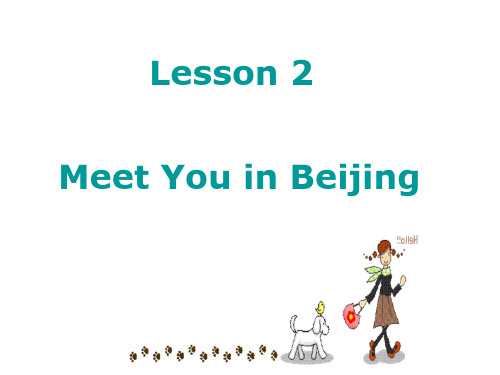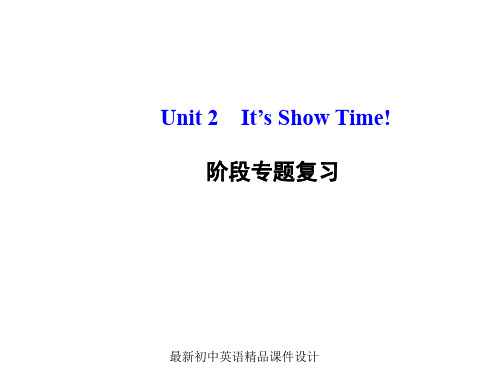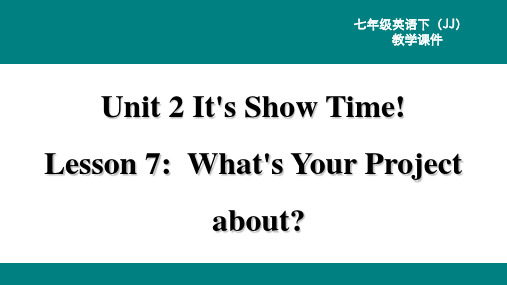新冀教版七年级英语下册Unit 2精品课件
合集下载
Lesson2课件冀教版英语七年级下册

You will learn about China.
You will not/won’t learn about China.
Will I learn about China?
Yes,you will. / No, you won’t.
5. Arrive in Beijing. 到达某地arrive in(大地点)/at(小地点) = get to = reach+sp. They will arrive at the park in five minutes. When will they arrive in Shanghai?
We don’t __h_a_v_e_ e_n_o_u__gh _t_im__e_ to see red leaves. 3. 你的旅行计划是什么?
What is the _p_la_n__ __f_o_r__ your trip? 4. 我们将在火车站接他们。
We __w_i_ll_ _m__e_e_t _ _th_e_m__ at the railway station.
Can you say these numbers?
1 114
one thousand one
hundred (and) fourteen
6 500 five hundred
six thousand (and)
Language points
1.How exciting (it is)!感叹句
How happy (the boy is) !=What a happy boy (he is)! 请翻译:多聪明的一个孩子啊!多有用的书啊! How clever the boy is!=What a clever boy he is! What a useful book it is!= How useful the book is!
You will not/won’t learn about China.
Will I learn about China?
Yes,you will. / No, you won’t.
5. Arrive in Beijing. 到达某地arrive in(大地点)/at(小地点) = get to = reach+sp. They will arrive at the park in five minutes. When will they arrive in Shanghai?
We don’t __h_a_v_e_ e_n_o_u__gh _t_im__e_ to see red leaves. 3. 你的旅行计划是什么?
What is the _p_la_n__ __f_o_r__ your trip? 4. 我们将在火车站接他们。
We __w_i_ll_ _m__e_e_t _ _th_e_m__ at the railway station.
Can you say these numbers?
1 114
one thousand one
hundred (and) fourteen
6 500 five hundred
six thousand (and)
Language points
1.How exciting (it is)!感叹句
How happy (the boy is) !=What a happy boy (he is)! 请翻译:多聪明的一个孩子啊!多有用的书啊! How clever the boy is!=What a clever boy he is! What a useful book it is!= How useful the book is!
最新 冀教版 七年级英语下 公开课课件 Unit2 Unit Review课件(共15张PPT)

ቤተ መጻሕፍቲ ባይዱ
Listening & Speaking
Make a conversation(work in pairs): 1.What do you see on the way? 2.What is happening around you?
Smile, smile, smile
冀教版 七年级下册
Review of Lesson 7
Jenny and Danny were doing projects for school. Do you remember what their projects about?
Review of Lesson 8
What do we learn about marco Polo in Lesson 8 ?
Review of Lesson 9
What did we learn from danny’s school
project in Lesson 9 ?
Review of Lesson 10
What do Li Ming and Wang Mei discuss in Lesson 10 ?
Review of Lesson 11
Grammar in Use
Write the correct forms for each verb.
Present tense see
Past tense
saw heard
read
hear
read
have
had
brought
bring
give
gave got sent did
get
send do
Listening & Speaking
Listening & Speaking
Make a conversation(work in pairs): 1.What do you see on the way? 2.What is happening around you?
Smile, smile, smile
冀教版 七年级下册
Review of Lesson 7
Jenny and Danny were doing projects for school. Do you remember what their projects about?
Review of Lesson 8
What do we learn about marco Polo in Lesson 8 ?
Review of Lesson 9
What did we learn from danny’s school
project in Lesson 9 ?
Review of Lesson 10
What do Li Ming and Wang Mei discuss in Lesson 10 ?
Review of Lesson 11
Grammar in Use
Write the correct forms for each verb.
Present tense see
Past tense
saw heard
read
hear
read
have
had
brought
bring
give
gave got sent did
get
send do
Listening & Speaking
最新冀教版初中英语七年级下册《Lesson 2 Meet You in Beijing》精品PPT课件 (1)

How far is it from Shijiazhuang to Beijing? 从石家庄到北京有多远?
最新初中英语精品课件设计
Arrive in Beijing and take a train to Xi’an 到 达北京然后乘火车去西安。
arrive为不及物动词,意为“到达”,后接地 点名词时要接介词in或at。arrive in +后接大地 方;arrive at 后接小地方。
最新初中英语精品课件设计
Fill in the blanks using “will” and the given verbs. 1.A:When will the train leave (leave)? B:In ten minutes. 2.We will arrive (arrive) in China next week. 3.George will visit (visit) his grandparents next Saturday. 4.My bike is broken. I will take (take) a bus to school this afternoon. 5.I will give (give) my mother a special gift for Mother’s Day tomorrow. 6.Will you come (come) with me to Beijing tomorrow?
LESSON 2 MEET YOU IN BEIJING
最新初中英语精品课件设计
New Words
•exciting adj.使人激动的 •along prep.沿着…… •Kilometre n.千米,公里 •special adj.特别的;专门的 •culture n.文化;文明 •arrive v.到达;抵达 •leave v.动身;出发;离开
最新初中英语精品课件设计
Arrive in Beijing and take a train to Xi’an 到 达北京然后乘火车去西安。
arrive为不及物动词,意为“到达”,后接地 点名词时要接介词in或at。arrive in +后接大地 方;arrive at 后接小地方。
最新初中英语精品课件设计
Fill in the blanks using “will” and the given verbs. 1.A:When will the train leave (leave)? B:In ten minutes. 2.We will arrive (arrive) in China next week. 3.George will visit (visit) his grandparents next Saturday. 4.My bike is broken. I will take (take) a bus to school this afternoon. 5.I will give (give) my mother a special gift for Mother’s Day tomorrow. 6.Will you come (come) with me to Beijing tomorrow?
LESSON 2 MEET YOU IN BEIJING
最新初中英语精品课件设计
New Words
•exciting adj.使人激动的 •along prep.沿着…… •Kilometre n.千米,公里 •special adj.特别的;专门的 •culture n.文化;文明 •arrive v.到达;抵达 •leave v.动身;出发;离开
最新冀教版初中英语七年级下册《Unit 2 It's Show Time!》精品PPT课件

4. They went to the cinema last Sunday. (对画线部分提问) ________ ________ they ________ last Sunday? 5. I cleaned my room last night. (对画线部分提问) ________ ________ you ________ your room? 答案:4. What did; do 5. When did; clean
He ________ to school yesterday.
3. We watched TV at home. (改为否定句)
We ________ ________ TV at home. 答案:1. Did; have; did 2. went
3. didn’t watch
最新初中英语精品课件设计
We went to see the Beijing Opera in the theater. It’s really a Chinese treasure. I like the music and the colourful clothes. By
最新初中英语精品课件设计
the way, I also ate some delicious foods. Beijing Duck is a kind of wonderful food. I hope to eat more next time.
—Yes, I did.
6. Who ________ (invent) the computer?
7. Jack ________ (go) shopping and ________ (cook) supper
yesterday.
冀教版七年级英语下册Unit 2《Lesson 10 Music and Dance》课件

The new Phrases.
think about 考虑take part in 参加play music 演奏音乐I can’t wait to do 我迫不及待做某事I hope so 我希望如此Why don’t you do sth?为什么不做某事?
can’t wait to do sth
to open
3.Why don’t you learn a traditional Chinese dance?Why don’t you do sth=_____________________为什么不做某事?Why don’t you ask Mr.Wang for help?(同义句) _________ _______ ask Mr.Wang for help?4.Then we can take part in the Spring Festival show together. take part in的意思是__________.Did you _______ _______ ______(参加) the sports meeting yesterday?5.动词变名词: eg. play-player sing-singer clean-cleaner report-reporter teach-teacherdance-dancer drive-driver visit-visitor invent-inventor 认真观察变化规律
Read the lesson and write true(T)or false(F).
T
F
T
I want to learn to play the erhu! 我想学习拉二胡!
1)learn to do sth.,学习做某事。 The girl wants to learn to draw. 这个女孩想学画画。2)play跟乐器一般加the。play the guzheng,弹古筝。play the piano,弹钢琴。
冀教版七年级下册英语精品教学课件 Unit 2 It's Show Time! Lesson 7

a task for school
ቤተ መጻሕፍቲ ባይዱ
anywhere
the traditions and beliefs of a group of people
4. Read the lesson and fill in the blanks.
Danny and Jenny went on a ___t_r_ip___ to China. After they came back, Danny was very tired. He ___s_le_p_t__ for two full days. Now they are getting ready for their _p_r_o_j_e_c_ts_. Jenny will talk about Marco Polo for her project. Danny’s project is about some places of interest in China. He will talk about some places and things they saw along the Silk Road. Will Danny talk about donuts? No! The Silk Road is about the __h_i_st_o_r_y_ and _c_u_l_tu__re__ of China. It’s not about donuts!
Let’s Do It!
1. Listen to the dialogues and write true (T) or false (F). 1. Danny slept for three full days. ( F ) 2. Jenny’s project is about Marco Polo. ( T ) 3. Jenny and Danny will go home and work on their projects. ( F )
【最新】冀教版七年级英语下册Unit 2 It's show time精品课件.ppt

非谓语动词 1. I hope ________(write) a book like that someday. 2. I can’t wait _______ (play) music for all my friends. 3. Just try your best _________ (guess) it.
(colour) 2. Lanzhou noodles look _____ and taste ______. A. good, great B. good, well C. well, good D. well, well. 3. Your story is very ______________ (interest). 4. They taste __________ (real) good.
city. 10. I ____________ (take) this picture in Xi’an
last weekend.
9、春去春又回,新桃换旧符。在那桃花盛开的地方,在这醉人芬芳的季节,愿你生活像春天一样阳光,心情像桃花一样美丽,日子像桃子一样甜蜜。 2021/1/112021/1/11Monday, January 11, 2021
句型转换: 1. The trip gave me an idea. (同义句)
The trip _______ _______ ______ _______. 2. The Chinese discovered coal. (一般疑问句)
______ the Chinese _______ coal? 3. He brought some coal and paper back to Italy
10、人的志向通常和他们的能力成正比例。2021/1/112021/1/112021/1/111/11/2021 9:11:05 PM 11、夫学须志也,才须学也,非学无以广才,非志无以成学。2021/1/112021/1/112021/1/11Jan-2111-Jan-21 12、越是无能的人,越喜欢挑剔别人的错儿。2021/1/112021/1/112021/1/11Monday, January 11, 2021 13、志不立,天下无可成之事。2021/1/112021/1/112021/1/112021/1/111/11/2021
(colour) 2. Lanzhou noodles look _____ and taste ______. A. good, great B. good, well C. well, good D. well, well. 3. Your story is very ______________ (interest). 4. They taste __________ (real) good.
city. 10. I ____________ (take) this picture in Xi’an
last weekend.
9、春去春又回,新桃换旧符。在那桃花盛开的地方,在这醉人芬芳的季节,愿你生活像春天一样阳光,心情像桃花一样美丽,日子像桃子一样甜蜜。 2021/1/112021/1/11Monday, January 11, 2021
句型转换: 1. The trip gave me an idea. (同义句)
The trip _______ _______ ______ _______. 2. The Chinese discovered coal. (一般疑问句)
______ the Chinese _______ coal? 3. He brought some coal and paper back to Italy
10、人的志向通常和他们的能力成正比例。2021/1/112021/1/112021/1/111/11/2021 9:11:05 PM 11、夫学须志也,才须学也,非学无以广才,非志无以成学。2021/1/112021/1/112021/1/11Jan-2111-Jan-21 12、越是无能的人,越喜欢挑剔别人的错儿。2021/1/112021/1/112021/1/11Monday, January 11, 2021 13、志不立,天下无可成之事。2021/1/112021/1/112021/1/112021/1/111/11/2021
【最新】冀教版七年级英语下册Unit 2 Lesson 7精品课件.ppt

点击进入相应模块
Ⅱ. 句型展示 1. ——我们旅行之后, 你好好休息了吗? — ______ you ______ a ______ ______ after our trip? ——是的,我睡了整整两天! —Yes,I ______ for two ______ days! 答案:Did; have; good rest; slept; full
点击进入相应模块
1. interest n. 兴趣 ◆My project is about some places of interest in China. 我的课题是关于中国的一些名胜的。 ◆She showed (an) interest in the meeting. 她对这次会议表现出了兴趣。 ◆He has two great interests. One is sports and the other is music. 他有两大爱好: 一个是体育, 另一个是音乐。
点击进入相应模块
3. We ______ (see) some people walk along the river yesterday. 4. They are talking about the ______ (place) and things on their trip. 5. I have something ______ (fun) to tell you. 答案:3. saw 4. places 5. funny
点击进入相应模块
Ⅰ. 用所给词的适当形式填空 1. There are many places of ______ (interesting)in Beijing. 2. I was very tired after the long trip. So I ______ (sleep) for three full days. 答案:1. interest 2. slept
Ⅱ. 句型展示 1. ——我们旅行之后, 你好好休息了吗? — ______ you ______ a ______ ______ after our trip? ——是的,我睡了整整两天! —Yes,I ______ for two ______ days! 答案:Did; have; good rest; slept; full
点击进入相应模块
1. interest n. 兴趣 ◆My project is about some places of interest in China. 我的课题是关于中国的一些名胜的。 ◆She showed (an) interest in the meeting. 她对这次会议表现出了兴趣。 ◆He has two great interests. One is sports and the other is music. 他有两大爱好: 一个是体育, 另一个是音乐。
点击进入相应模块
3. We ______ (see) some people walk along the river yesterday. 4. They are talking about the ______ (place) and things on their trip. 5. I have something ______ (fun) to tell you. 答案:3. saw 4. places 5. funny
点击进入相应模块
Ⅰ. 用所给词的适当形式填空 1. There are many places of ______ (interesting)in Beijing. 2. I was very tired after the long trip. So I ______ (sleep) for three full days. 答案:1. interest 2. slept
- 1、下载文档前请自行甄别文档内容的完整性,平台不提供额外的编辑、内容补充、找答案等附加服务。
- 2、"仅部分预览"的文档,不可在线预览部分如存在完整性等问题,可反馈申请退款(可完整预览的文档不适用该条件!)。
- 3、如文档侵犯您的权益,请联系客服反馈,我们会尽快为您处理(人工客服工作时间:9:00-18:30)。
“谈论旅游见闻和感受”。
点击进入相应模块
【习作练习】 李明暑假期间和父母去北京旅行,他们参观了历史博物馆 等名胜;看了中国的国粹——北京京剧;吃了北京的特产—— 北京烤鸭。请帮助李明给詹妮写一封电子邮件告诉她自己的北 京之行。 要求: 1. 词数: 80个左右(短文的开头和结尾已经给出, 不计入总 词数); 2. 根据所给信息可适当增加细节, 以使行文连贯。
点击进入相应模块
4. The teacher brought me some books just now. (改为否定句) The teacher ______ ______ me ______ books just now. 5. The boy went shopping this morning. (对画线部分提问) ______ ______ the boy ______ this morning? 答案:4. didn’t bring; any 5. What did; do
点击进入相应模块
【探究总结】 (1)一般过去时表示过去发生的动作或存在的状态, 常和a
moment ago, last year, yesterday, at that time, in the past 等表
示过去的时间副词连用。
点击进入相应模块
(2)一般过去时的构成:
was were
didn’t
Yours,
Li Ming
点击进入相应模块
【思路点拨】
(1)此篇作文以旅游为主线,以谈论旅游见闻为主要内容。
由此决定在写作过程中要运用的主要时态为一般过去时。
(2)单元实用短语、句型储备
places of interest
Chinese treasure
learn a lot about. . .
点击进入相应模块
Dear Jenny,
ห้องสมุดไป่ตู้
______________________________________________________
______________________________________________________ ______________________________________________________ ______________________________________________________ ______________________________________________________
holiday. We visited many places of interest there. For example, the
History Museum. I saw many ancient things. And I learned a lot about the history and culture in our country.
答案:3. studied, carried, cried 4. shopped, stopped 5. led, left, sent, hit, held, rang, built, brought
点击进入相应模块
【探究总结】 动词过去式分为规则变化和不规则变化两种情况。 规则动词的过去式变化如下: ed d
I can’t wait to. . .
I hope. . .
点击进入相应模块
【佳作鉴赏】 Dear Jenny, I can’t wait to tell you something about my trip to Beijing. I went on a trip to Beijing with my parents during the summer
点击进入相应模块
3. study ______ carry ______ cry ______
4. shop ______ stop ______
5. lead ______ leave ______ send ______ hit ______ hold ______
ring ______ build ______ bring ______
Did
点击进入相应模块
本单元围绕“Show Time”,以回忆丝绸之路之旅的见闻和
感受为话题,从丹尼、詹妮的课题,詹妮的聊天记录,以及李 明的博客等多个方面,以不同形式练习了语言知识,学习了一 般过去时的用法,让学生明确发生过的事情如何用英语进行表 达。而最能体现本单元话题和语言运用能力的话题作文就是
点击进入相应模块
Ⅱ. 句型转换 1. My brother walks to school every morning. ( 用 yesterday
morning改写句子)
My brother ______ ______ ______ yesterday morning. 2. I was happy last weekend. (改为一般疑问句并作肯定回答) — ______ you ______ last weekend? —Yes, I ______. 答案:1. walked to school 2. Were; happy; was
Unit 2
It’s Show Time!
点击进入相应模块
点击进入相应模块
一般过去时 Ⅰ. 写出下列动词的过去式 1. play ______ clean ______ work ______ 2. live ______ invite ______ dance ______ believe ______ realize ______ 答案:1. played, cleaned, worked 2. lived, invited, danced, believed, realized
点击进入相应模块
3. David watched a basketball game a long time ago. (改为一般 疑问句并作否定回答) —______ David ______ a basketball game a long time ago? —No, ______ ______ . 答案:Did; watch; he didn’t
